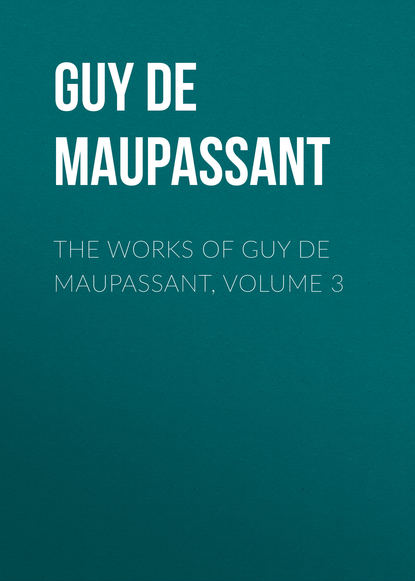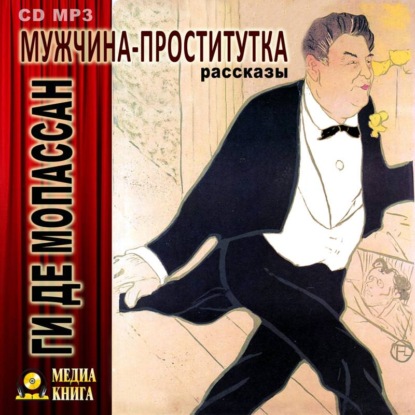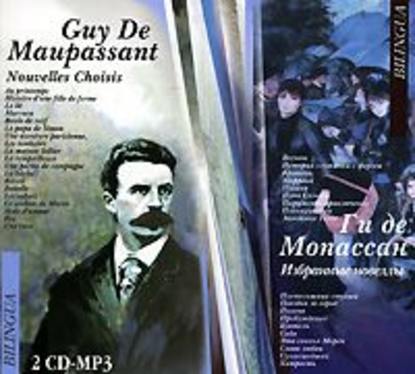
Полная версия
The Works of Guy de Maupassant, Volume 3
Nobody heard that cry, which came from the depths or a woman's heart, nobody saw how pale and how excited that woman was, who usually seemed made of marble, not even the soldier who was the cause of it. He was a Hungarian poet, who, like so many other Honveds5, now wore the uniform of an Austrian soldier.
Two days later, to his no small surprise he was told to go to the General in command, as orderly, and when he reported himself to the adjutant, he told him to go to Frau von Kubinyi's, and to await her orders.
Our poet only knew her by report, but he hated and despised the beautiful woman, who had sold herself to the enemy of the country, most intensely; he had no choice, however, but to obey.
When he arrived at her house, he seemed to be expected, for the porter knew his name, took him into his lodge, and without any further explanation, told him immediately to put on the livery of his mistress, which was lying there ready for him. He ground his teeth, but resigned himself without a word to his wretched, though laughable fate; it was quite clear that the actress had some purpose in making the poet wear her livery. He tried to remember whether he could formerly have offended her by his notices as a theatrical critic, but before he could arrive at any conclusion, he was told to go and show himself to Frau von Kubinyi.
She evidently wished to enjoy his humiliation.
He was shown into a small drawing-room, which was furnished with an amount of taste and magnificence such as he had never seen before, and was told to wait. But he had not been alone many minutes, before the door-curtains were parted and Frau von Kubinyi came in, calm but deadly pale, in a splendid dressing gown of some Turkish material, and he recognized his former mistress.
"Irma!" he exclaimed.
The cry came from his heart, and it also affected the heart of the woman, who was surfeited with pleasure, so greatly that the next moment she was lying on the breast of the man whom she had believed to be dead, but only for a moment, and then he freed himself from her.
"We are fated to meet again thus!" she began.
"Not through any fault of mine," he replied bitterly.
"And not through mine either," she said quickly; "everybody thought that you were dead, and I wept for you; that is my justification."
"You are really too kind," he replied sarcastically. "How can you condescend to make any excuses to me? I wear your livery, and you have to order, and I have to obey; our relative positions are clear enough."
Frau von Kubinyi turned away to hide her tears.
"I did not intend to hurt your feelings," he continued: "but I must confess that it would have been better for both of us, if we had not met again. But what do you mean by making me wear your livery? It is not enough that I have been robbed of my happiness? Does it afford you any pleasure to humiliate me as well?"
"How can you think that?" the actress exclaimed. "Oh! Ever since I have discovered your unhappy lot, I have thought of nothing but the means of delivering you from it, and until I succeed in doing this, however, I can at least make it more bearable for you."
"I understand," the unhappy poet said with a sneer. "And in order to do this, you have begged your present worshiper, to turn your former lover into a footman."
"What a thing to say to me!"
"Can you find any other plea?"
"You wish to punish me for having loved you, idolized you, I suppose?" the painter continued. "So exactly like a woman! But I can perfectly well understand that the situation promises to have a fresh charm for you…"
Before he could finish what he was saying, the actress quickly left the room; he could hear her sobbing, but he did not regret his words, and his contempt and hatred for her only increased, when he saw the extravagance and the princely luxury with which she was surrounded. But what was the use of his indignation? He was wearing her livery, he was obliged to wait upon her and to obey her, for she had the corporal's cane at her command, and it really seemed as if he incurred the vengeance of the offended woman; as if the General's insolent mistress wished to make him feel her whole power; as if he were not to be spared the deepest humiliation.
The General and two of Frau von Kubinyi's friends, who were servants of the Muses like she was, for one was a ballet dancer, and the two others were actresses, had come to tea, and he was to wait on them.
While it was getting ready, he heard them laughing in the next room, and the blood flew to his head, and when the butler opened the door Frau von Kubinyi appeared on the General's arm; she did not, however, look at her new footman, her former lover, triumphantly or contemptuously, but she gave him a glance of the deepest commiseration.
Could he after all have wronged her?
Hatred and love, contempt and jealousy were struggling in his breast, and when he had to fill the glasses, the bottle shook in his hand.
"Is this the man?" the General said, looking at him closely.
Frau von Kubinyi nodded.
"He was evidently not born for a footman," the General added.
"And still less for a soldier," the actress observed.
These words fell heavily on the unfortunate poet's heart, but she was evidently taking his part, and trying to rescue him from his terrible position.
Suspicion, however, once more gained the day.
"She is tired of all pleasures, and satisfied with enjoyment," he said to himself; "she requires excitement and it amuses her to see the man whom she formerly loved, and who, as she knows, still loves her, tremble before her. And when she pleases she can see me tremble; not for my life, but for fear of the disgrace which she can inflict upon me at the moment if it should give her any pleasure."
But suddenly the actress gave him a look which was so sad and so imploring, that he looked down in confusion.
From that time he remained in her house without performing any duties, and without receiving any orders from her; in fact he never saw her, and did not venture to ask after her, and two months had passed in this way, when the General unexpectedly sent for him. He waited, with many others, in the ante-room, and when the General came back from parade, he saw him and beckoned him to follow, and as soon as they were alone, he said:
"You are free, as you have been allowed to purchase your discharge."
"Good heavens!" the poet stammered, "how am I to …"
"That is already done," the General replied. "You are free."
"How is it possible? How can I thank your Excellency!"
"You owe me no thanks," he replied; "Frau von Kubinyi bought you out."
The poor poet's heart seemed to stop; he could not speak, nor even stammer a word; but with a low bow, he rushed out and tore wildly through the streets, until he reached the mansion of the woman whom he had so misunderstood, quite out of breath; he must see her again, and throw himself at her feet.
"Where are you going to?" the porter asked him.
"To Frau von Kubinyi's."
"She is not here."
"Not here?"
"She has gone away."
"Gone away? Where to?"
"She started for Paris two hours ago."
DELILA
In a former reminiscence,6 we made the acquaintance of a lady, who had done the police many services in former years, and whom we called Wanda von Chabert. It is no exaggeration, if we say that she was at the same time the cleverest, the most charming and the most selfish woman whom one could possibly meet. She was certainly not exactly what is called beautiful, for neither her face nor her figure were symmetrical enough for that, but if her head was not beautiful in the style of the antique, neither like the Venus of Milo nor Ludoirsi's Juno, it was, on the other hand, in the highest sense delightful like the ladies whom Wateau and Mignard painted. Everything in her little face, and in its frame of soft brown hair was attractive and seductive, her low, Grecian forehead, her bright, almond shaped eyes, her small nose, and her full, voluptuous lips, her middling height and her small waist with its, perhaps, almost too full bust, and above all her walk, that half indolent, half coquettish swaying of her broad hips, were all maddeningly alluring.
And this woman, who was born for love, was as eager for pleasure and as amorous as few other women have even been, but for that very reason she never ran any danger of allowing her victims to escape her from pity; on the contrary, she soon grew tired of each of her favorites, and her connection with the police was then extremely useful to her, in order to get rid of an inconvenient, or jealous lover.
Before the war between Austria and Italy in 1859, Frau von Chabert was in London, where she lived alone in a small, one-storied house with her servants, and was in constant communication with emigrants from all countries.
She herself was thought to be a Polish refugee, and the luxury by which she was surrounded, and a fondness for sport, and above all for horses, which was remarkable even in England, made people give her the title of Countess. At that period Count T – was one of the most prominent members of the Hungarian propaganda, and Frau von Chabert was commissioned to pay particular attention to all he said and did; but in spite of all the trouble she took, she had not hitherto even succeeded in making his acquaintance. He lived the life of a misanthrope, quite apart from the great social stream of London, and he was not believed to be either gallant, or ardent in love. Fellow-countrymen of his, who had known him formerly, during the Magyar revolution, described him as very cautious, cold and silent, so that if any man possessed a charm against the toils, which she set for him, it was he.
Just then it happened that as Wanda was riding in Hyde Park quite early one morning before there were many people about, her thoroughbred English mare took fright, and threatened to throw the plucky rider, who did not for a moment lose her presence of mind, from the saddle. Before her groom had time to come to her assistance, a man in a Hungarian braided coat rushed from the path, and caught hold of the animal's reins. When the mare had grown quite quiet, he was about to go away with a slight bow, but Frau von Chabert detained him, so that she might thank him, and so had leisure to examine him more closely. He was neither young nor handsome, but was well-made, like all Hungarians are, and had an interesting and very expressive face. He had a sallow complexion, which was set off by a short, black full beard, and he looked as if he were suffering, while he fixed two, great, black fanatical eyes on the beautiful young woman, who was smiling at him so amiably, and it was the strange look in those large eyes which aroused in the soul of the woman who was so excitable, that violent, but passing feeling which she called love. She turned her horse and accompanied the stranger on his side, and he seemed to be even more charmed by her chatter than by her appearance, for his grave face grew more and more animated, and at last he himself became quite friendly and talkative. When he took leave of her, Wanda gave him her card, on the back of which her address was written, and he immediately gave her his in return.
She thanked him and rode off, looking at his name as she did so; it was Count T – .
She felt inclined to give a shout of pleasure when she found that the noble quarry, which she had been hunting so long, had at last come into her preserves, but she did not even turn her head round to look at him, such was the command which that woman had over herself and her movements.
Count T – called upon her the very next day, soon he came every day, and in less than a month after that innocent adventure in Hyde Park, he was at her feet; for when Frau von Chabert made up her mind to be loved, nobody was able to withstand her. She became the Count's confidante almost as speedily as she had become his mistress, and every day, and almost every hour, she, with the most delicate coquetry, laid fresh fetters on the Hungarian Samson. Did she love him?
Certainly she did, after her own fashion, and at first she had not the remotest idea of betraying him; she even succeeded in completely concealing her connection with him, not only in London but also in Vienna.
Then the war of 1859 broke out, and like most Hungarian and Polish refugees, Count T – hurried off to Italy, in order to place himself at the disposal of that great and patriotic Piedmontese statesman, Cavour.
Wanda went with him, and took the greatest interest in his revolutionary intrigues in Turin; for some time she seemed to be his right hand, and it looked as if she had become unfaithful to her present patrons. Through his means, she soon became on intimate terms with Piedmontese government circles, and that was his destruction.
A young Italian diplomatist, who frequently negotiated with Count T – , or in his absence, with Wanda, fell madly in love with the charming Polish woman, and she, who was never cruel, more especially when she herself had caught fire, allowed herself to be conquered by the handsome, intellectual, daring man. In measure as her passion for the Italian increased, so her feelings for Count T – declined, and at last she felt that her connection with him was nothing but a hindrance and a burden, and as soon as Wanda had reached that point, her adorer was as good as lost.
Count T – was not a man whom she could just coolly dismiss, or with whom she might venture to trifle, and that she knew perfectly well; so in order to avoid a catastrophe, the consequences of which might be incalculable for her, she did not let him notice the change in her feelings towards him at first, and kept the Italian, who belonged to her, at a proper distance.
Конец ознакомительного фрагмента.
Текст предоставлен ООО «ЛитРес».
Прочитайте эту книгу целиком, купив полную легальную версию на ЛитРес.
Безопасно оплатить книгу можно банковской картой Visa, MasterCard, Maestro, со счета мобильного телефона, с платежного терминала, в салоне МТС или Связной, через PayPal, WebMoney, Яндекс.Деньги, QIWI Кошелек, бонусными картами или другим удобным Вам способом.
1
Arise!
2
One of Sacher-Masoch's novels. – TRANSLATOR.
3
The street where most of the best shops are to be found, and much frequented by venial beauties. – TRANSLATOR.
4
Head of the Criminal Investigation Department. – TRANSLATOR.
5
A Hungarian word, meaning literally, Defender of the Fatherland. The term Honved is applied to the Hungarian Landnehr, or Militia. – Translator.
6
An Exotic Prince.












